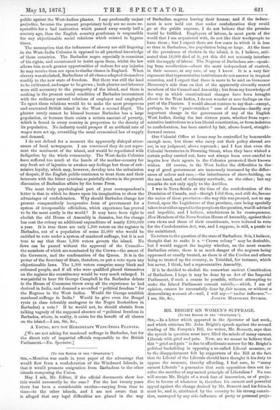[TO THIS EDITOR OF TRH SPROTA.TOR.1
S2R,—Mention was made in your paper of the advantage that would flow from a confederation of the Windward Islands, in that it would promote emigration from Barbadoes to the other islands composing the Union.
May I ask, Mr. Editor, if the official documents show how this would necessarily be the case ? For the last twenty years there has been a considerable exodus—varying from time to time-4o the other islands, and I am not aware that it is alleged that any legal difficulties are placed in the way of Barbadian negroes leaving their homes; and if the induce- ment is now held out that under confederation they could. go at the public expense, I do not believe that the promise would be fulfilled. Employers of labour, in most parts of the world that I am acquainted with, do not like their workpeople to leave them ; but I expect there are few cases in which it is leas so than in Barbadoes, the population being so large. At the time of the prevalence of cholera in the island, it is, I believe, esti- mated that 14,000 died of it, yet this did not seriously interfere with the supply of labour. The Negroes of Barbadoes are—speak- ing from recollection—about the most independent of control, in their manner, at any rate, of any I know. It is a very fair argument that representative institutions do not answer in tropical countries, and I expect that there is more to be said on Governor Hennessy's side than on that of the apparently absurdly scared members of the Council and Assembly; but from my knowledge of the way in which constitutional changes have been brought about in the West Indies, I do not wonder at sore feelings on the part of the Planters. I would almost venture to say that—except, perhaps, in the " panic-stricken " case of Jamaica—hardly any important change in the government of any of the English West Indies, during the hat sixteen years, whether from repre- sentative institutions to a less liberal constitution, or from isolation to confederation, has been carried by fair, above-board, straight- forward means.
Our Colonial Office at home may be controlled by honourable- enough men, but those who carry out their policy abroad are not, in my judgment, above reproach ; and I fear that even the Colonial Secretaries in Downing Street, when they have wished a certain policy carried out, have not always been over-careful to inquire how their agents in the Colonies promoted their known wishes. Of course, in the West Indies the difficulties in the way of good government are immensely increased by the differ- ences of colour and race,—the inheritances of slave-holding, on the one hand, and of voluntary servitude, on the other ; but my remarks do not only apply to the Antilles.
I was in Nova Scotia at the time of the confederation of the Dominion of Canada, and—though I did then, and still do, favour the union of these provinces—the way this was pressed, not to nay forced, upon the Legislature of that province, care being specially taken to avoid an appeal to the people on the question, was ill-advised and impolitic, and I believe, mischievous in its consequences.. How Members of the N ova Scotian House of Assembly, against their- own views and those of their constituents, were induced to vote- for the Confederation Act, was, and I suppose, is still, a puzzle to the uninitiated.
To return to the question of the state of Barbadoes. It is, I believe, thought that to make it a "Crown colony" may be desirable, but I would suggest the inquiry whether, on the most remote Barbadian estate, there is as much danger of the negroes being oppressed or cruelly treated, as there is of the Coolies and othens being so treated up the country, in Trinidad, for instance, which has never, I think, had a representative Assembly.
If it be decided to abolish the somewhat ancient Constitution of Barbadoes, I hope it may be done by an Act of the Imperial Parliament, if such a course be possible, without attempting to make the Island Parliament commit suicide,—which, I am of opinion, cannot be successfully done by fair means, or without a demoralising amount of—well, I will say—" undue influence."—


































 Previous page
Previous page